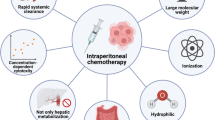Abstract
PURPOSE: The treatment of peritoneal carcinomatosis and sarcomatosis has been associated with long-term disease-free survival. Recently, new intraperitoneal chemotherapy regimens used in patients with small volume peritoneal implants have shown benefits. METHODS: After removal of all but minimal residual disease, the abdominal cavity is flooded with a large volume of fluid containing full systemic doses of chemotherapy. Adenocarcinoma patients receive mitomycin C and 5-fluorouracil; sarcoma patients receive cisplatin and doxirubicin. RESULTS: Long-term disease-free survival is seen in patients with low-grade malignancy, no lymph node or liver metastases, and a complete cytoreduction. CONCLUSIONS: If patients can be treated early when the volume of peritoneal surface cancer is low or if the patient can be made disease free by surgery, then intraperitoneal chemotherapy may be expected to achieve long-term disease-free survival in a majority of selected patients.
Similar content being viewed by others
References
Jacquet P, Vidal-Jove J, Zhu BW, Sugarbaker PH. Peritoneal carcinomatosis from intraabdominal malignancy: natural history and new prospects for management. Acta Chir Belg (in press).
Sugarbaker PH, Graves T, DeBruijn EA,et al. Rationale for early postoperative intraperitoneal chemotherapy (EPIC) in patients with advanced gastrointestinal cancer. Cancer Res 1990;50:5790–4.
Sugarbaker PH, Graves T, Sweatman TW. Early postoperative intraperitoneal adriamycin. Pharmacologic studies and a preliminary clinical report. Reg Cancer Treat 1991;4:127–31.
Sugarbaker PH, Cunliffe WJ, Belliveau JF,et al. Rationale for integrating early postoperative intraperitoneal chemotherapy (EPIC) into the surgical treatment of gastrointestinal cancer. Semin Oncol 1989;16:83–97.
Eggermont AM, Steller EP, Marquet RL, Jeekel J, Sugarbaker PH. Local promotion of tumor growth after abdominal surgery is dominant over immunotherapy with interleukin-2 and lymphokine activated killer cells. Cancer Detect Prev 1988;12:421–9.
Sugarbaker PH. Staging of peritoneal carcinomatosis treated by cytoreductive surgery and intraperitoneal chemotherapy. Ann Surg (in press).
Esquivel J, Vidal-Jove J, Steves MA, Sugarbaker PH. Morbidity and mortality of cytoreductive surgery and intraperitoneal chemotherapy. Surgery 1993;113:631–6.
Sugarbaker PH, Esquivel J, Vidal-Jove J, Steves MA. Treatment of peritoneal carcinomatosis from colon or appendiceal cancer with induction chemotherapy Surgery 1993;113:631–6.
Vidal-Jove J, Esquivel J, Buck D, Barrios P, Steves MA, Sugarbaker PH. Technical aspects of adjuvant intraperitoneal chemotherapy. In: Banzet P, Holland JF, Kayat D, Weil M. Proceedings of the III Congress on Neoadjuvant Chemotherapy, Springer-Verlag, 1993:239.
Sugarbaker PH. Peritonectomy procedures and regional chemotherapy for non-metastasizing colonic and appendical cancer. Ann Surg (in press).
Murio JE, Sugarbaker PH. Gastrointestinal fistula following enterai complications after cytoreductive surgery and intraperitoneal chemotherapy: incidence and outcome. J Exp Clin Cancer Res 1993;12:153–8.
Sugarbaker PH. Ostomy construction: prevention of lateral paraostomy hernia. Surg Gynecol Obstet 1989;169:75–7.
Author information
Authors and Affiliations
About this article
Cite this article
Sugarbaker, P.H. Intraperitoneal chemotherapy for treatment and prevention of peritoneal carcinomatosis and sarcomatosis. Dis Colon Rectum 37 (Suppl 2), S115–S122 (1994). https://doi.org/10.1007/BF02048443
Issue Date:
DOI: https://doi.org/10.1007/BF02048443




